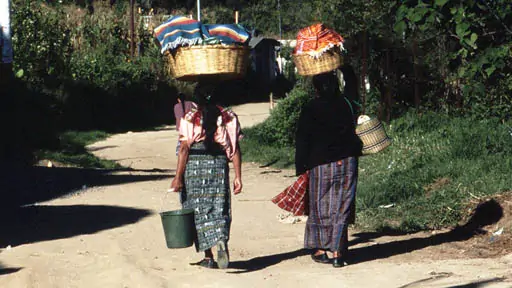Indigenous Calendar March, 2012: K'iche' Maya Suffrage in Guatemala

The indigenous peoples of Guatemala represent about 40% of the country's 14 million inhabitants. Outside of the main urban centers they represent the country's majority population. Almost all of them are of Maya descent. While their pre-colonial history relates one of the most successful and long-standing of any human society (around two-dozen Mayan languages are still spoken in Guatemala), their post-colonial history is marked by struggle and repression. Most recently during the Guatemalan civil war — which began in 1960 and continued for thirty-six years — they were the target of horrendous treatment at the hands of the Guatemalan military.
During the civil war a Maya K'iche' woman, Rigoberta Menchú Tum, rose to international fame because of her efforts to bring world attention to the plight of Guatemala's indigenous peoples. In 1992 she received the Nobel Peace Prize for her work.
Guatemala is officially a democracy today. Yet its indigenous peoples continue to struggle against discrimination, poverty and loss of traditional lands. On September 9, 2007 they had their first real chance in almost five hundred years to help reverse this trend: Rigoberta Menchú Tum was a candidate in the Presidential election. Why her Encuentro por Guatemala (The Meeting of Guatemala) party took only 3% of the vote is a matter of speculation (the turn-out was about 60%).
Since no winning candidate emerged on September 9 a run-off election was scheduled for November 4. Very early on that morning I arrived in Momostenango — a predominantly K'iche' municipality of about ninety thousand people in the western Guatemalan highlands.
I knew I had to arrive early to complete my work that day because it was not only national Election Day in Guatemala but also market day in Momostenango Township. The importance of market day in communities such as this cannot be overstated. Seventy percent of the municipality's population lives in the surrounding hills so market day is the lifeblood of the local economy. Even though I'd arrived early the main commerce — buying and selling food — had already begun to wind down. After taking photos I ate a late breakfast and made my way to the nearest polling station.
Because of the country's recent political history I wasn't sure if I — an obvious foreigner — would be allowed to enter the polling station, let alone be allowed to take photos. In the end I met with no problems; perhaps because of my professional camera equipment and the number of photographs I was taking they thought I was a sanctioned journalist or an official observer. Or perhaps it was because so few people had turned up to vote at the polling station.
Leaving the polling station I walked toward the outskirts of the township. The route was mainly filled with K'iche' people leaving the market — it was late afternoon by now. As I saw these two women carrying home what they had not sold I considered asking them whether they had voted earlier that day. My better judgment left me asking myself whether they would vote in the September, 2011 election.
If you enjoyed reading this article, please consider supporting independent, advertising-free journalism by buying us a coffee to help us cover the cost of hosting our web site. Please click on the link or scan the QR code. Thanks!


